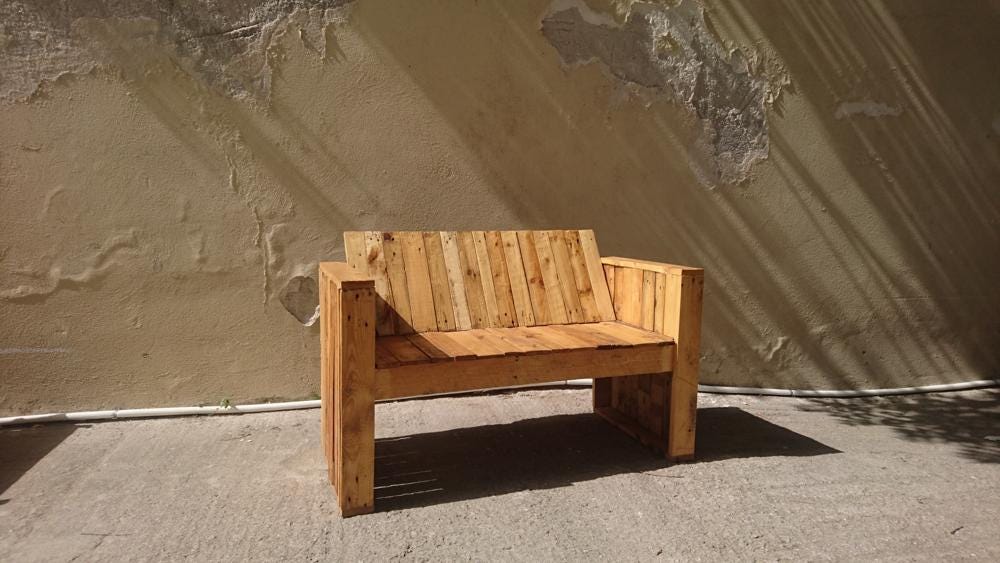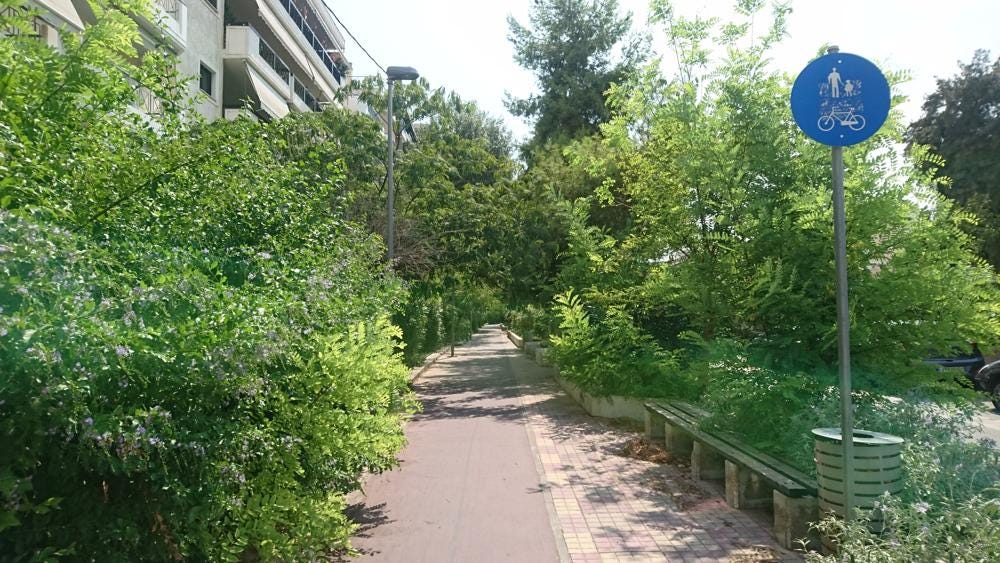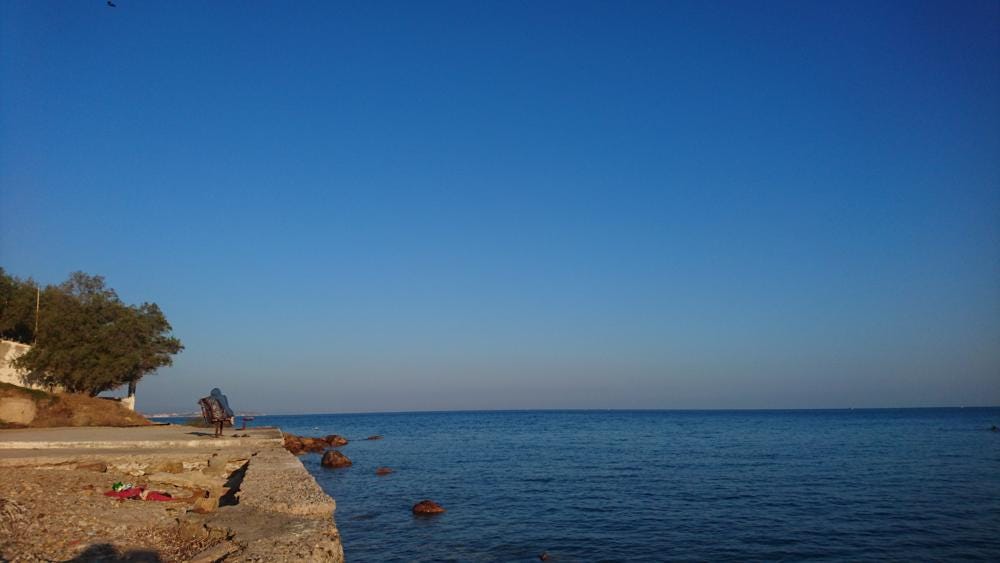#87: There's a blood moon eclipse tonight

Happy Friday!
I'm writing this from Chios, hoping that my phone reception doesn't flip into Turkish and I get charged £12.50 per megabyte. First world problems, I suppose.
Where I am now is less than 5 miles from Turkey: the mountains of Anatolia rise easily over the horizon. It's the tantalising gap between Asia and Europe, between fear and safety for refugees from the wars in Syria and beyond.
I arrived here by sea from Athens, an uncomfortably mundane undertaking that many of us passengers spent playing cards, slurping frozen yoghurt, or dozing in our seats under airconditioning.
We made shore at dawn and I was collected from the port by a genial soldier wearing an Italian sports shirt and khaki shorts. He slung my bike into the back of his pickup and drove me to his flat along the seaside scenic route, pointing out notable sites. The airfield, the supermarket, Turkey.
There are approximately 2,000 refugees living here on Chios, in a camp built for 1,200. All of them arrived after crossing that 5 mile stretch of sea. For some of the refugees that I've met, it's the culmination of more than a year's work.
Unless they have support from their family, these refugees must first spend six to nine months working in Turkish factories to earn the fee for that 5 mile crossing.
I could stroll to the port tomorrow morning and book onto a ferry that'd take me to Turkey in half an hour. I probably wouldn't die and it'd cost me £20. But I digress.
At the moment, boats are landing from Turkey every 2-3 days, with an average cargo of 40 refugees every time. I say 'cargo' because these humans aren't humanised for a while yet. When they arrive, their landing grounds are automatic crime scenes.
Volunteers can't enter the crime scene without the permission of the police. The police aren't stupid, though, and, after sweeping the refugees for possible traffickers, the volunteers are allowed to offer emergency aid and hand out supplies. Blankets, food, water.
A bus then takes the refugees from the landing site to the port, and from the port to the camp 8km inland. If it's too early for the bus, the volunteers hand out yoga mats and the refugees sleep on the shoreline.
This is part one of the story. This is only the beginning. In Chios, refugees face a long wait. Many have been here for three, six, nine months. They long for the dream 'transfer' to Athens where they are at least on continental ground.
The government is stretched thin, so voluntary organisations like Khora try to facilitate some form of future.
But when talking to the people who work for these organisations, I keep hearing of the same problems. Volunteers, both refugee and non-refugee, are exhausted and unfortunately don't have access to the golden goose, or limitless supplies of donations, time or energy.
One organisation with a different approach is Ankaa.
Ankaa are trying to build a network of social enterprises, not only for refugees, but for anyone. Their focus is on training people in marketable skills such as carpentry, sewing and computer coding, and helping them build their own jobs.
From my snapshot viewpoint, I think this is the only way that refugees can find a future in this country. Greek nationals struggle to find work and even science graduates consider themselves lucky if they get a job in a shop for €3 per hour.
New arrivals, already on the breadline, cannot afford to wait for vacancies that won't come. Similarly, volunteer-led organisations without any means of income will always struggle for long-term sustainability.
I really hope Ankaa find a way to bring both problems together and, in so doing, solve them.

The cafe at Ankaa, where people can learn barista skills and perhaps one day snag a job in the busy tourist cafes of Athens.

The only cycle path in Athens. It's an absolute corker. They should build more!
If you're into cycling, or into reading about cycling, then check out my User's Guide to Cycling in Athens. It's full of cheerful tips like this:
As in most countries, most Athenians will consider you crazy for cycling in their city. As in most countries, they're correct. So don't let that stop you.
Cycling in cities has never been pleasant. Even the 'greenest' towns still have hundredweight hulks of metal hurtling around the streets, the slightest touch from which could kill you instantly.
So enjoy Athens and think about it this way: every moment you spend cycling here is a moment you won't be killed on the streets of some less exotic habitation.
>> INPUT
Psychotic traits in comedians, Ando et al. (2018) "Most striking was the comedians' high score on both introverted anhedonia and extraverted impulsiveness. This unusual personality structure may help to explain the facility for comedic performance." And much else besides.
How Emotions Are Made by Lisa Feldman-Barrett. This is an absurdly fascinating book about what it says on the cover. So many head-nodding moments that it's worth reading twice.
Phantom Islands - A Sonic Atlas "Poised somewhere between cartographical fact and maritime fiction, [Phantom Islands] haunted seafarers’ maps for hundreds of years, inspiring legends, fantasies, and counterfactual histories." (Thanks TD!)
While We Sleep, Our Mind Goes on an Amazing Journey (National Geographic). A long read about the science of sleep.
Slightly salty tea.
OUTPUT >>
Sunset on Strefi (July)
...COMING UP...
Cycling around Chios, talking to refugees and the people who hang out with them.
The slow boat to Kavala.
An even slower cycle to Thessaloniki.
...And coming up the week after...
FOILED goes live on Monday 6 August at 18:30. It'll be on iPlayer shortly after, no doubt. Tonypandy's finest salon, Bleach for the Stars, is in crisis: Sabrina's back from holiday.

Current location: Agia Ermioni.
Now On: The Victor Frankl 5-a-day Book Club!
Membership Criteria: Read 5 pages a day of Man's Search for Meaning to complete the whole darn text in only 28 days. I'll be tootling through the text at just 5 pages a week, so you've got plenty of time to catch up.
Day 13, p70-74
Today's pages bring us to the end of the Nazi rule of the concentration camp of which Frankl was a prisoner. But not without one last twist of fate.
Frankl's celebrations at the coming of the Red Cross delegate was short-lived. The SS arrived that night and ordered the camp to be cleared, and the prisoners taken to another camp where they would be transferred to Switzerland.
But after a mistake by the Chief Doctor, Frankl was not put on any of the trucks which understandably left him '[s]urprised, very annoyed and disappointed'.
That night, the battle-front reached the camp with 'the noise of rifles and cannons; the flashes of tracer bullets and gun shots'.
The shooting decreased and morning dawned. Outside on a the pole at the camp gate a white flag floated in the wind.
Later, Frankl learnt that the SS trucks had never been going to Switzerland.
Our friends who had thought they were travelling to freedom that night had been taken in the trucks to this camp, and there they were locked in the huts and burned to death.
'[E]ven in those last hours,' Frankl writes, 'fate had toyed with us few remaining prisoners.'
Frankl continues his discussion of the physical and psychological conditions of the camp - the one influencing the other, and vice versa.
Hunger and a lack of sleep led to a general irritability that created frequent violent flash points, particularly between those prisoners who had gained some position of responsibility and those who had not.
Frankl himself suffered from almost insurmountable irritability when he was tasked with the responsibility of keeping the typhus hut clean. The frequent inspections were 'more for the purpose of torture than of hygiene', he says.
I was forced to keep straightening blankets, picking up bits of straw which fell from the bunks, and shouting at the poor devils who tossed in their beds and threatened to upset all my efforts.
[O]ne's own irritability took on enormous proportions in the face of the other's apathy and especially in the face of the danger (i.e., the approaching inspection) which was caused by it.
---
We will continue next week...
By the way, these words aren't solely for my own self-edification. If you've got any thoughts, comments or requests I'd be delighted to hear from you. Simply reply to this email. :)
Much love,
- dc
CREDITS
David Charles wrote this. David is currently gallivanting around Europe and will be talking to refugees in Greece. He is also co-writer of BBC Radio sitcom Foiled, does copywriting for The Bike Project and is almost always available for work. davidcharles.info // @dcisbusy

A shirt I didn't buy.


